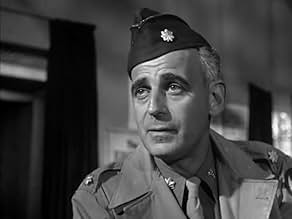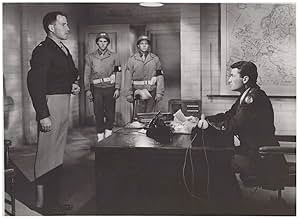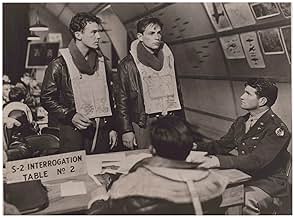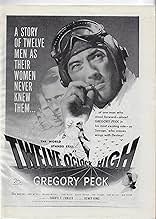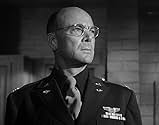A tough-as-nails general takes over a B-17 bomber unit suffering from low morale and whips them into fighting shape.A tough-as-nails general takes over a B-17 bomber unit suffering from low morale and whips them into fighting shape.A tough-as-nails general takes over a B-17 bomber unit suffering from low morale and whips them into fighting shape.
- Won 2 Oscars
- 9 wins & 5 nominations total
- Lt. Bishop
- (as Bob Patten)
- Lt. Zimmerman
- (as Lee Mac Gregor)
- Officer
- (uncredited)
- Radio Operator
- (uncredited)
- Clerk in Antique Shop
- (uncredited)
- Operations Officer
- (uncredited)
- Mr. Britton
- (uncredited)
- RAF Officer
- (uncredited)
Featured reviews
'Twelve O'Clock High' is essentially the best depiction of a particular theatre of World War II--the extremely hazardous, aerial daylight bombing campaign over Germany. This film is the archetype for that entire lineage of war film. But it is memorable for its strong performances rather than well-directed battle scenes. In fact there are no battle scenes except for borrowed aerial combat footage. Yet few other films have the look of a 'big' WWII film better than this one--even though it is shot mostly indoors or in cramped cockpits.
Gregory Peck plays an Air Force commander in England in 1943. His performance here is one of Hollywood's icons. Peck is at his best-- taut, controlled, and powerful; flawless throughout every scene as a sensitive air commander forced to whip and browbeat a demoralized and resentful B-24 squadron back into peak efficiency. Peck runs roughshod over his new outfit, but he has a secret achille's heel--he fears he will grow too fond of the men he commands, the emotional link rendering him as ineffective as his predecessor (played by Gary Merrill).
There are crisp, well-directed scenes where the stiff-necked Peck rides his men with extra fury in order to steel himself against all attachments. Yet as we and Peck learn by the end of the film, it is impossible. Despite Peck's best preventive measures, the squadron continues to suffer heavy casualties, and Peck, no matter how hard he resists, is drawn into an emotional attachment with the young pilots he must order into battle each morning.
All soldiers know that comradery is the sharpest of double-edged swords during combat. You can never predict when you will lose a buddy--thus its a common practice for soldiers to keep their relationships light. This storyline has been treated loosely by a slew of later films, but never as successfully as it is done here. Every aspect of the emotional hazards of this type of wartime bond is fully dissected, and the film is filled with scenes containing extraordinary close-ups where the actor's facial expressions alone reveals the character's bitten-back response. This is especially gripping during the film's many vehement, man-to-man exchanges involving discipline, implied cowardice or dereliction of duty.
In particular there are two wonderful subplots to the film: look for the subtle interplay between Peck and Gary Merrill (the brother officer Peck is forced to replace) with regard to the "filling of someone else's shoes" and an actual pair of flyer's boots that they borrow back and forth between them. Then there is another bit of business between Peck and a recalcitrant executive officer, Hugh O'Brian.
The scenes between Peck and O'Brian, in particular, will almost make you wince, if you have ever in your life been chewed out by anyone or tried to 'measure up' to what you thought was expected of you. The relationships between Peck and the other officers exposes issues about the choices men must make about each other and about their duty in wartime; and lays bare the emotions involved when they are forced to depend on one another; as well as what happens when they are forced to fail one another. Its simply outstanding.
'Twelve O'Clock High' stands quietly in the ranks of the few really great American films, without any ego or hype. If you can still remember how important it can be to feel part of a team, even if it was only on a kickball or dodge-ball field that when you last had that feeling then you will admire this film. Dean Jagger won a Best Supporting Actor for his role as the reservist, and there are fine performances from every other actor as well. Millard Mitchell, an absolutely wonderful character actor, is without peer in a role he played often, that of a salty WWII general. And Peck, as we know, walks away with his role.
If you have ever pondered what the real meaning of over-used words like 'loyalty' and 'devotion' mean then this film is for you. The unfettered treatment of these hard-to-pin-down ideals is what makes it one of the few really great war films, for my money (yes, guys, sorry to say, its better than "The Great Escape").
When you are tired of watching the endless parade of "smart" "slick" and "funny" films, all filled with frivolous, stereotype-mocking characters, rent this one to see the real thing.
Following the intro with Dean Jagger, the action gets off to a good start with the B17 crash landing, a man staggering out to vomit, a reference to a wounded man's brain being visible and an account of Bishop's bravery. This is strong stuff for 1949.
It avoids a lot of war film clichés. There's no love interest (there's even a nod to the fact that the men weren't always faithful to their loved ones back home). There's no attempt to create a group of men who represent the breadth of society back home. You know the sort of thing - the New York cabbie, the young farm boy, the Texan, the idealistic schoolteacher, the journalist, the architect who's now bombing things that he once built. And it's about failure, it's about men destroying their bodies and their minds for something they don't understand. It reminds me of the colour-sergeant's reply to a soldier in Zulu, who asks 'Why us?'. 'Because we're 'ere, lad. Just us. Nobody else.' If I wanted to sound pretentious, I'd use the word 'existential'.
It's about leadership and is similar to Nortwest Passage. Both Spencer Tracy in that film and Peck in this are aware that they are putting on an act. One of the great scenes is Peck arriving at the base. He's sitting in the front of the car. They stop and Peck offers his driver, whom he calls 'Ernie', a smoke. He thinks for a while, then grinds out his cigarette, says, 'Right, sergeant.' His driver snaps open the rear door and Peck becomes the general. Northwest Passage again - Tracy says 'I'm not a man now, I'm an officer responsible for men. If you meet me when I'm just a man, you might have to use a little charity.' Other nice touches: the way the fur-lined RAF boots become the symbol of leadership. The way the real-life footage is dovetailed into the main action, a tribute to the war-time cameramen as much as the editor. Notice how they filmed detail like empty shells falling to the aircraft floor.
So how could a film about military leadership help a local government manager, of all people. I couldn't bust people or demote them easily, rearrange their duties with a stroke of the pen. I would have loved to set up a leper colony, but the union wouldn't let me. But Peck's stressing of the need for pride in one's group is something that can be transferred to any walk of life.
Did you know
- TriviaThis film is used by the US Navy as an example of leadership styles in its Leadership and Management Training School. The Air Force's College for Enlisted Professional Military Education also uses it as an education aid in its NCO academies and Officer Training School. It is also used as a teaching tool for leadership at the Army Command and General Staff College and for leadership training in civilian seminars. It is used at the Harvard Business School as a case study in how to effect change in organizations.
- GoofsSavage is given command of the 918th and tells Pritchard that he'll get there "early" the next day. By the time he does arrive, Lt. Zimmerman has committed suicide, been given a funeral and Major Stovall has had time to get drunk afterwards.
- Quotes
Major Stovall: That is not why I am drunk tonight. I got drunk because I am confused. I was thinking, which is a thing a man should not do, and all at once I couldn't remember what any of them looked like. I, I couldn't see their faces, Bishop, Cobb, Wilson, Zimmy, all of them. All of you. They all looked alike, just one face. And it was very young. It confused me. I think I shall stay drunk until I'm not confused anymore.
- Crazy creditsOpening credits prologue: LONDON 1949
- ConnectionsEdited into La guerre, la musique, Hollywood et nous... (1976)
- SoundtracksDon't Sit Under the Apple Tree
(uncredited)
Music by Sam H. Stept
Lyrics by Charles Tobias and Lew Brown
Sung at the officers' club
- How long is Twelve O'Clock High?Powered by Alexa
Details
Box office
- Gross worldwide
- $4,499
- Runtime
- 2h 12m(132 min)
- Color
- Aspect ratio
- 1.37 : 1



